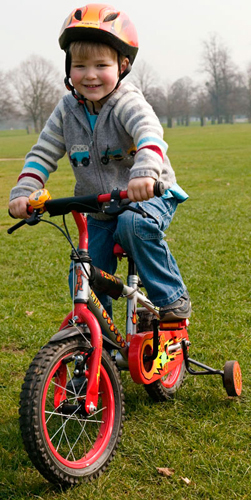5 points to remember
End of an era
You can congratulate yourself on getting him through the toddler
years. The skills he has learned have nurtured his curiosity and will
help him settle in at school and adapt to exciting challenges during the
years ahead.

Having fun
Let him try different experiences. Achieving new things will help continue to develop his confidence and self-esteem.

Your
child will start to understand that her actions have consequences,
which means she will also begin to understand the difference between
“right” and “wrong.”
You
are your child’s role model and she looks up to you. Be aware that at
this age her judgements and beliefs will be based solely on what you
tell her, what she learns, and, importantly, what she sees you do.
Children
with high self-esteem have positive expectations of themselves and
therefore achieve more highly; this, in turn, feeds self-esteem.
With
an increasingly active imagination, your child will probably develop
some fears. No matter how absurd these may seem, it is important not to
belittle your child or dismiss the way she is feeling. Aim to normalize
the situation as much as possible.
Accept
that your child is growing up and try not to be overprotective. She is
more robust than you may realize, and a change of environment and new
experiences that don’t involve you from time to time will be healthy for
her.
Managing a visiting toddler
When hosting a playdate, bear the following in mind:
Don’t be tempted
to favor the visitor over your own child, or you may find your child
will “act out” or resent her new friend. Don’t make comparisons between
the children.
Let the children direct their own play unless they come to you for ideas and input.
Minor
disagreements will probably resolve themselves without your
intervention. However, never leave small children unaccompanied or out
of earshot.
Treat your young visitor with respect and never lay a hand on someone else’s child.
If the other child is aggressive, explain that it is unacceptable to behave in that way in your house.
Bear
in mind that visiting toddlers are away from their environment and may
be “acting out” because they are anxious. Make sure they are not
intimidated or frightened in any way and ask what is troubling them.
If the behavior is severe, get in touch with the parent. Do not apply ignoring techniques or “time out”. You should never discipline another person’s child. You may risk the child being scared and the anger of the other parent.
If you need to reprimand, make sure you criticize the behavior and never the child.
Ideally agree on strategies with the visiting child’s parent beforehand.
How to deal with disputes
A playdate can go wrong in
an instant. Children are easily bored and may sometimes resort to
hitting out of frustration. To address this:
Use questions, such
as: “Did Sam hit you for a reason, Sally?”/“Sam, was there a reason why
you hit Sally?”/“Are you hurt? No. That’s good. Do you want to keep
playing this game or have you both had enough now?”
Make your expectation clear: “You know that hitting is not allowed. I expect you to play together nicely. Can you do that?”
Make the consequence clear: “If this continues, you will have to stop playing this game and I may need to separate you.”
Provided there is no
fear or true violence involved, children forgive and forget quite
quickly. At this age, the occasional fracas is to be expected